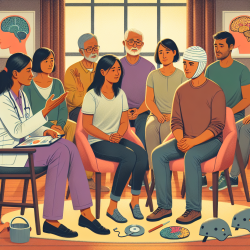As online therapy continues to grow, ensuring cultural safety is essential for providing effective and equitable services. The recent research article "Health professional perspectives on translation of cultural safety concepts into practice: A scoping study" offers valuable insights for practitioners looking to improve their skills in this area. This blog will explore the key findings and suggest ways to implement these insights into your practice.
Understanding Cultural Safety
Cultural safety goes beyond cultural competence by focusing on the relational aspects of care. It involves recognizing and addressing power imbalances and biases that affect interactions with clients from diverse backgrounds. The concept, developed in New Zealand, emphasizes the need for health professionals to reflect on their own cultural identities and the impact these have on their practice.
Key Findings from the Study
The scoping study identified several factors that help health professionals translate cultural safety concepts into practice:
- Learning Through Direct Experience: Engaging directly with diverse communities helps practitioners understand cultural nuances and build meaningful relationships. This experiential learning often involves discomfort, which is a crucial part of the process.
- Individual Qualities: Personal attributes such as empathy, open-mindedness, and the ability to reflect on one's own biases are vital. Health professionals who can intentionally engage with their values and biases are better equipped to provide culturally safe care.
- Cultural Training: Effective cultural training programs address both content and process. They should include practical applications, focus on addressing racism, and be developed collaboratively with participants to foster a sense of ownership and engagement.
Implementing Cultural Safety in Online Therapy
To integrate cultural safety into your online therapy practice, consider the following steps:
- Engage in Continuous Learning: Seek opportunities to interact with diverse communities and learn from these experiences. This could involve participating in community events or collaborating with organizations that serve minority populations.
- Reflect on Personal Biases: Regularly assess your own cultural beliefs and biases. Engage in self-reflection exercises and seek feedback from colleagues and clients to gain a deeper understanding of how your cultural identity impacts your practice.
- Enhance Relational Skills: Develop skills such as empathy, validation, and curiosity. These are essential for building trust and rapport with clients from diverse backgrounds. Consider training programs or workshops that focus on these relational skills.
- Participate in Cultural Training: Look for training programs that address both the content and process of cultural safety. Ensure that these programs include practical applications and foster a supportive learning environment that can manage discomfort.
Encouraging Further Research
While the scoping study provides valuable insights, there is still a need for more research on how to effectively implement cultural safety in online therapy. Practitioners are encouraged to contribute to this body of knowledge by sharing their experiences and participating in research initiatives.
To read the original research paper, please follow this link: Health professional perspectives on translation of cultural safety concepts into practice: A scoping study.










